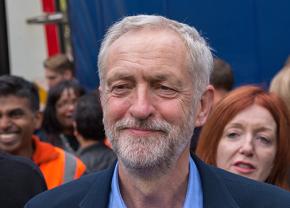What does Corbyn’s victory mean?
looks at the background to Jeremy Corbyn's election success--and at what having a left-winger at the head of the Labour Party will mean for British politics.
IT'S HARD, without resorting to political clichés, to describe the stunning election of socialist member of Parliament (MP) Jeremy Corbyn as leader of Britain's Labour Party this past weekend.
Three months ago, when the race began, Corbyn was given virtually no chance of winning. Initially, he couldn't even find the 35 fellow Labour MPs needed to nominate him as a candidate in the leadership election. He scraped together enough support only because some MPs thought the vote would be too one-sided without a representative of the party's left.
Many of them soon regretted their decision. As soon as campaigning began, Corbyn's plainspoken opposition to austerity and war, and his support for wealth redistribution, renationalizing the railways, women's rights, rent control and refugees' rights began resonating with Labour supporters. By contrast, none of Corbyn's opponents rejected austerity, and none of them voted against the Tory government's latest attack on welfare recipients in July.
Young people in particular were attracted by Corbyn's authenticity. Thousands flocked to his rallies around the country and tens of thousands joined the Labour Party as members or supporters to vote in the leadership election.

In a four-way contest, Corbyn romped to victory with almost 60 percent of the vote. Political commentators have described Corbyn's victory as "unprecedented," a "political earthquake" and an "insurrection."
LIKE OTHER social democratic parties around the world, Labour has moved further and further to the right over the past 30 years, embracing neoliberalism and free-market economics. But in a repudiation of Tony Blair, Gordon Brown and other past leaders who engineered the rightward shift, the party has now elected the most left-wing leader in its history.
Corbyn has been in parliament since 1983, but always on the so-called backbenches, never in government or a member of the shadow cabinet. He was one of a dwindling number of activist, left-wing MPs in a party increasingly run by Blairite careerists and opportunists.
But a few years ago, Labour changed its rules to allow members and supporters to directly elect the party's leader and deputy leader. The aim was to weaken the role of trade unions in the party, but the rule change backfired spectacularly, allowing Corbyn to appeal directly to voters over the heads of the party establishment.
In recent weeks, as it became clear that Corbyn was on his way to victory, he was subject to increasingly hysterical attacks and smears, both from the mainstream media and from the party's right--including Tony Blair himself, who declared that Labour could not win the next election with Corbyn as leader.
The claim that Corbyn is unelectable is being made by people who don't understand how much the political environment has changed--even thought that's what led to Labour's spectacular failure in May's general election.
In Scotland, the latest vote left Labour, formally the dominant party, with just one seat. The Scottish National Party outflanked it on the left, taking advantage of Labour's refusal to take a stand against austerity. Now the Scottish revolt has now reached England.
In the U.S., Corbyn's victory is being compared to the unexpected success of Bernie Sanders' campaign for the Democratic presidential nomination. There are certainly similarities: Both Corbyn and Sanders are beneficiaries of a growing global revolt against neoliberalism, inequality and austerity.
But as a political candidate, Corbyn stands well to the left of Sanders, particularly on foreign policy issues. For instance, the new Labour leader has been an uncompromising opponent of imperialist wars and a long-time defender of Palestinian rights--Sanders is neither.
Corbyn can expect the attacks by the British media and the Tory government to intensify now that he has won the leadership election. Within a few minutes of the results being announced, for example, Prime Minister David Cameron tweeted "The Labour Party is now a threat to our national security, our economic security and your family's security."
But Corbyn will also have to deal with opposition within his own party. The vast majority of Labour's 232 MPs are well to his right. Several announced publicly that they would not serve in his shadow cabinet, an indication that they may try to undermine his leadership at the earliest opportunity. Labour has a left-wing leader, but it has not suddenly become a campaigning left-wing party.
For Corbyn to succeed, he will need to mobilize Labour members and broader social movements outside of parliament. It was a good sign that the first thing he did after being elected was to address a rally supporting the rights of refugees. But there is a long way to go. Corbyn's campaign has generated enormous enthusiasm, but that hasn't yet translated into the creation of effective organization.
Revolutionary socialists have always argued that Labour's commitment to parliamentary methods and gradual reform means that it can never be the vehicle for the socialist transformation of British society, even if it were to shed its support for neoliberalism.
Nevertheless, Corbyn's victory is a boost for the entire left, creating the opportunity in the weeks and months ahead to build an anti-austerity movement that encompasses activists both inside and outside the Labour Party. There is an enormous amount of work still to do, but Corbyn's spectacular victory is something the whole left should celebrate.


